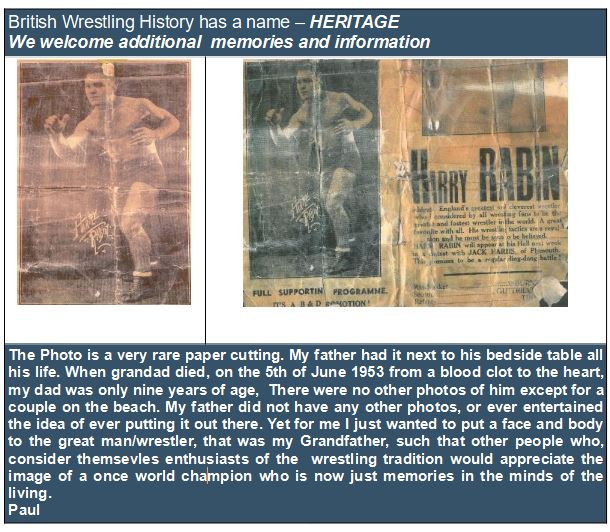Wrestling Heritage welcomes memories, further information and corrections.

Born in 1914 Harry Rabin was the working class hero, complete with two cauliflower ears. An accomplished amateur wrestler who made a successful and colourful transition to the professional ranks.
Those who saw London’s East ender Harry in action described him as a “pure wrestler.” Fans were promised a miniature Jack Sherry, and the accolades were verified when we spoke to Lou Ravelle, Harry’s last opponent in the ring. Harry’s amateur credentials were first rate, earning him a place as first reserve as lightweight in the 1934 Empire Games.
Later that year Harry turned professional with unlikely backers. Harry was a proud socialist who trained at the Stepney Workers Sports Club, a Jewish left wing club. Harry was a lifelong supporter of the socialist movement in Britain, raising funds for the cause during the 1930s
His professional wrestling career was reported in the sports pages of the Socialist Worker newspaper, which championed Harry as the Workers Champion. Harry frequently appeared wrestling at the Workers Gala Days organised by the socialist movement in the 1930s. On one occasion he travelled to Paris to compete as Britain’s only representative in the Anti-Fascist Sports Festival.
Reports suggest that Harry was a class act in an age when the legitimacy of professional wrestling was often questioned by the press. Following a match in October, 1935 the local press in Ramsgate reported that this was the “Mat game At its Best” and his contest with Cliffe Warner was the best technical contest ever seen in Ramsgate, “Fast,clean and clever, both fighters brought into play some of the neatest and most difficult throws in the game.” A contest in which he defeated Guido Rongo was said to have opened at an amazing pace, “Both men making free use of well known ju-jitsu throws and holds.” Harry was not related to the more famous Sam Rabin, though newspapers reported he “Was almost as good as his namesake.”
Appearances were not restricted to London and the south of England. As early as 1935 we find Harry working in northern England with appearances in Scotland following shortly.
In the late 1930s Harry won a world welterweight championship tournament at Lanes Club in London. Following a dispute with the promoters regarding payment for the contest he travelled to Australia. The story told to us was that promoter Jack Dale had publicly presented Harry with a cheque following the win of a “challenge match” at the Palais de Danse, Tufnell Park. Harry left the room, and the venue hurriedly, complete with the acquired cheques for £100. Whether there is any truth in this story we cannot possibly know. Jack Dale later re-acquainted himself with the cheque and was summoned to court. Newspapers reported that the charge was dropped after an explanation of the circumstances had been put forward.
That put paid to Harry’s British career for some time. Harry left London on 13th April, 1939 arriving in Cairns on the liner Strathmore, five weeks later on 20th May, 1939. Travelling with Harry was the New Zealand heavyweight, George Modrich.
Larger than life is a term attributed to many wrestlers. When we were told the following story about Harry by an ex wrestler we were sceptical, until we found evidence in the book “The Merchant Seamen’s War” by Tony Lane. On his return from Australia to Britain Harry survived the sinking of his vessel by torpedo but ended up in France. In Marseilles he joined the French Foreign Legion and was posted to Algiers. At the end of 1942 during the Anglo-American invasion of North Africa Harry deserted and was signed on as a crew member of the troop ship Ormonde.
Back in Britain Harry continued wrestling. We find fewer references towards the end of the 1940s yet he is listed as World Middleweight Champion in 1952 and appeared at the Royal Albert Hall for Atholl Oakeley in 1952 and 1953.
Many wrestlers fade away or disappear suddenly without trace. It fell to former wrestler Lou Ravelle to tell us in 2012 what happened to Harry. It was a tragic end to his career in June, 1953 Lou and Harry wrestled each other at Peterborough in a show in celebration of the coronation of Queen Elizabeth II. The referee for the match was George DeRelwyskow. Harry took a fall. Lou went to shake Harry’s hand and Harry collapsed at his feet. He was carried to the dressing room where he died. The following Saturday Al Hayes drove Lou to the inquest where a judgement of death by natural causes was declared.
Page reviewed 27/04/2022
1734
